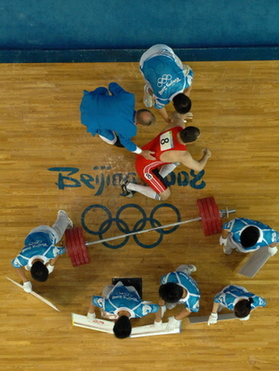Wang Jue had dreamed of becoming an Olympic volunteer for three years, from the day in July 2005 when he learned he had been accepted to a university in Beijing.
After taking 160 hours of classes over five semesters, in subjects ranging from Olympic history to journalism, he at last got the chance to serve during the Beijing Olympics as a professional media volunteer.
Wang says that his training improved his communication skills and gave him the confidence to interact with journalists from around the world.

Arsen Kasabiev of Georgia (C) falls after failing a lift as volunteers use boards to hide him in the men's 94 kg weightlifting event during the 2008 Beijing Olympic Games in Beijing on August 17, 2008. [Agencies]
|
He was a Help Desk Assistant at the International Broadcast Center, decked out in busy waves of yellow, blue, grey, and white, the official volunteer uniform.
The surrounding desks and tables were stacked high with city maps and brochures in countless languages.
"Working with journalists is quite fun," he says. "You can always offer somebody something, and this kind of giving can make you happy."
During his time on the job, Wang and his enthusiastic colleagues have also thought a lot about what it means to be a volunteer.
"For many Chinese students, it's the first chance to be volunteers. It's pretty precious and valuable," says Linna Bie, who was a Transportation Desk Assistant during the Olympics.
Hong Chen, a volunteer director and physics professor at Tsinghua University, puts the experience in perspective. "Organizing work is very tough," she says. "Getting people from different circles working together at the same time is such a challenge."
The Beijing Olympics received more than one million volunteer applications, of which 74,715 were accepted, plus 30,000 for the Paralympic Games. However, Zhang Juming, deputy director of the Volunteer Work Department of the Organizing Committee for the Beijing Olympic Games, says that 1 million people in fact volunteered services in various fields, including medical, traffic and security assistance. That's the equivalent of the entire population of Guatemala helping to run a sporting event.
Zhang thinks volunteerism will be one of the most powerful legacies of the Olympics. "The Games will foster an attitude of mass participation and long-term growth of the volunteer mentality in China," he said during a press conference. Due to the experience of managing the Olympic volunteer program, he believes that China will be able to run more volunteer initiatives in the future.
Many Chinese Olympic volunteers took great pride in their work and their contribution to history. "Without the volunteers, there could be no great Olympics," says Wang. "Maybe it's the biggest ever event in China, and maybe the biggest event of my lifetime."
Linna sees her volunteer job as a win-win situation. "On the one hand I can serve the country," she explains. "And on the other hand I can improve myself through inner evaluation and inner improvement."
Even after the Beijing Olympics conclude, the spirit of service will live on in the hearts of many volunteers. "When this Games ends, it's not ending, but a new beginning," says Linna.